古诗词英译之《春晓》
- 格式:pdf
- 大小:3.27 MB
- 文档页数:16
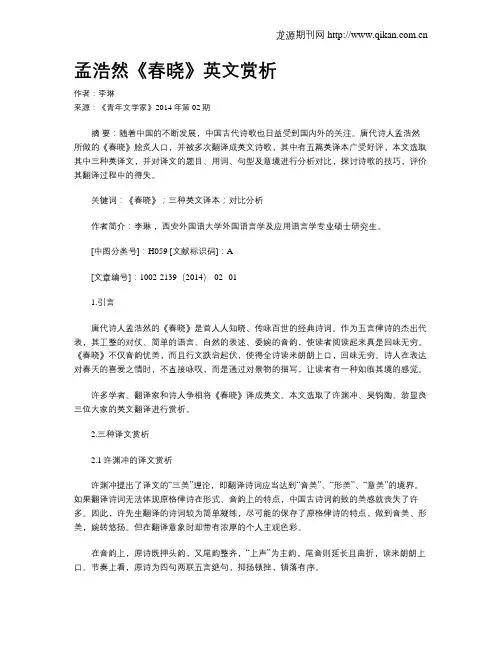
孟浩然《春晓》英文赏析作者:李琳来源:《青年文学家》2014年第02期摘要:随着中国的不断发展,中国古代诗歌也日益受到国内外的关注。
唐代诗人孟浩然所做的《春晓》脍炙人口,并被多次翻译成英文诗歌,其中有五篇英译本广受好评,本文选取其中三种英译文,并对译文的题目、用词、句型及意境进行分析对比,探讨诗歌的技巧,评价其翻译过程中的得失。
关键词:《春晓》;三种英文译本;对比分析作者简介:李琳,西安外国语大学外国语言学及应用语言学专业硕士研究生。
[中图分类号]:H059 [文献标识码]:A[文章编号]:1002-2139(2014)-02--011.引言唐代诗人孟浩然的《春晓》是首人人知晓、传咏百世的经典诗词。
作为五言律诗的杰出代表,其工整的对仗、简单的语言、自然的表述、委婉的音韵,使读者阅读起来真是回味无穷。
《春晓》不仅音韵优美,而且行文跌宕起伏,使得全诗读来朗朗上口,回味无穷。
诗人在表达对春天的喜爱之情时,不直接咏叹,而是通过对景物的描写,让读者有一种如临其境的感觉。
许多学者、翻译家和诗人争相将《春晓》译成英文。
本文选取了许渊冲、吴钧陶、翁显良三位大家的英文翻译进行赏析。
2.三种译文赏析2.1许渊冲的译文赏析许渊冲提出了译文的“三美”理论,即翻译诗词应当达到“音美”、“形美”、“意美”的境界。
如果翻译诗词无法体现原格律诗在形式、音韵上的特点,中国古诗词韵致的美感就丧失了许多。
因此,许先生翻译的诗词较为简单凝练,尽可能的保存了原格律诗的特点,做到音美、形美,婉转悠扬。
但在翻译意象时却带有浓厚的个人主观色彩。
在音韵上,原诗既押头韵,又尾韵整齐,“上声”为主韵,尾音则延长且曲折,读来朗朗上口。
节奏上看,原诗为四句两联五言绝句,抑扬顿挫,错落有序。
许译运用了“抑扬,抑扬,抑扬,抑扬”的模式,以四音步诗的节奏再现了原文音韵整齐的特点,全诗的音韵如行云流水般优美动听,译诗的前两句很好地把握住了原诗的意境。
中文诗虽无主语,但是以作者自身的所见所闻进行描述,译诗直接将其描述为“This morning of spring in bed I’m Lying,Not woke up till I hear birds crying.”译诗中用“crying”表示鸟的啼叫声,为译诗添上了一层悲哀的感情色彩。
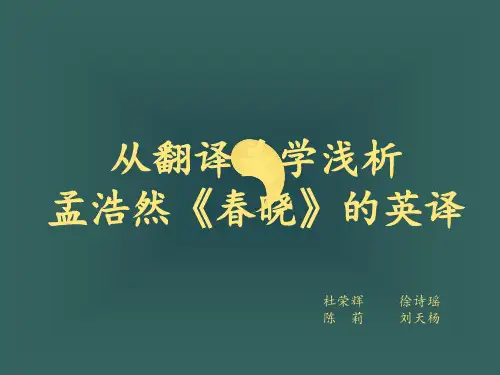
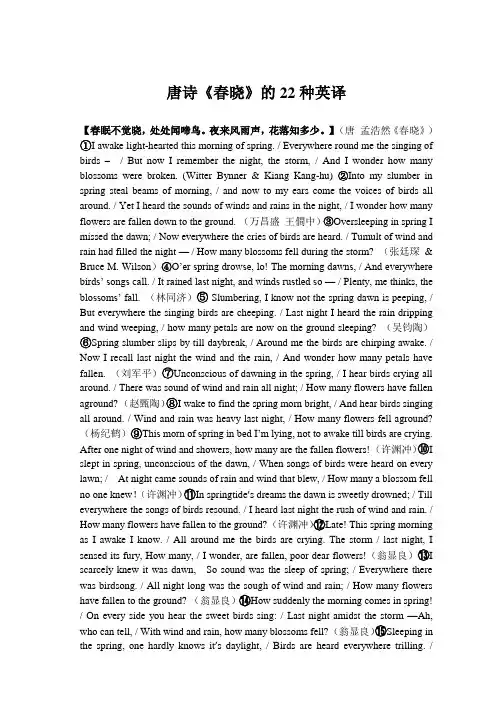
唐诗《春晓》的22种英译【春眠不觉晓,处处闻啼鸟。
夜来风雨声,花落知多少。
】(唐孟浩然《春晓》)①I awake light-hearted this morning of spring. / Everywhere round me the singing of birds –/ But now I remember the night, the storm, / And I wonder how many blossoms were broken. (Witter Bynner & Kiang Kang-hu) ②Into my slumber in spring steal beams of morning, / and now to my ears come the voices of birds all around. / Yet I heard the sounds of winds and rains in the night, / I wonder how many flowers are fallen down to the ground. (万昌盛王僴中)③Oversleeping in spring I missed the dawn; / Now everywhere the cries of birds are heard. / Tumult of wind and rain had filled the night — / How many blossoms fell during the storm? (张廷琛& Bruce M. Wilson)④O’er spring drowse, lo! The morning dawns, / And everywhere b irds’ songs call. / It rained last night, and winds rustled so — / Plenty, me thinks, the blossoms’ fall. (林同济)⑤ Slumbering, I know not the spring dawn is peeping, / But everywhere the singing birds are cheeping. / Last night I heard the rain dripping and wind weeping, / how many petals are now on the ground sleeping? (吴钧陶)⑥Spring slumber slips by till daybreak, / Around me the birds are chirping awake. / Now I recall last night the wind and the rain, / And wonder how many petals have fallen. (刘军平)⑦Unconscious of dawning in the spring, / I hear birds crying all around. / There was sound of wind and rain all night; / How many flowers have fallen aground? (赵甄陶)⑧I wake to find the spring morn bright, / And hear birds singing all around. / Wind and rain was heavy last night, / How many flowers fell aground? (杨纪鹤)⑨This morn of spring in bed I’m lying, not to awake till birds are crying. After one night of wind and showers, how many are the fallen flowers! (许渊冲)⑩I slept in spring, unconscious of the dawn, / When songs of birds were heard on every lawn; / At night came sounds of rain and wind that blew, / How many a blossom fell no one knew!(许渊冲)⑪In springtide’s dreams the dawn is sweetly drowned; / Till everywhere the songs of birds resound. / I heard last night the rush of wind and rain. / How many flowers have fallen to the ground? (许渊冲)⑫Late! This spring morning as I awake I know. / All around me the birds are crying. The storm / last night, I sensed its fury, How many, / I wonder, are fallen, poor dear flowers!(翁显良)⑬I scarcely knew it was dawn, So sound was the sleep of spring; / Everywhere there was birdsong. / All night long was the sough of wind and rain; / How many flowers have fallen to the ground? (翁显良)⑭How suddenly the morning comes in spring! / On every side you hear the sweet birds sing: / Last night amidst the storm —Ah, who can tell, / With wind and rain, how many blossoms fell? (翁显良)⑮Sleeping in the spring, one hardly knows it’s daylight, / Birds are heard everywhere trilling. /There’ve been sounds of wind and rain in the night, / How many blossoms have been falling? (翁显良)⑯I slept in spring not conscious of the dawn, / But heard the gay birds chattering all round, / I remember, there was a storm at night. / Pray, how many blossoms have fallen down? (翁显良)⑰Sleeping in spring oblivious of dawn / everywhere I hear birds / after the wind and rain last night / I wonder how many petals fell (Red Pine) ⑱Asleep in the spring, dawn comes to me unawares; / I hear the birds singing all round. / When night comes there’s the sound of wind and rain; / Who knows how many blossoms fall to the ground. (Peter Harris)⑲I scarcely knew it was dawn, / So round was the sleep of spring; / Everywhere there was birdsong. / All night long was the sough of wind and rain; / How many flowers have fallen to the ground? (刘师舜1967)⑳How suddenly the morning comes in Spring! / On every side you hear the sweet birds sing. / Last night amidst the storm – Ah, who can tell, / With wind and rain, how many blossoms fell? (DAWN IN SPRING John Turner) 21.In drowsy spring I slept till daybreak / When the birds cry here and there, I awake. / Last night I heard a storm of wind and rain, / How many blossoms have fallen again? (《中国翻译》杂志2001年第2期)22. This spring morning in bed I’m lying / Not awake till I hear birds crying. / After one night of wind and showers / How many are the fallen flowers? (《中国翻译》杂志2001年第2期)注:这是本人正在编著的《汉英翻译大辞典》中的一个词条。

唐诗《春晓》的22种英译【春眠不觉晓,处处闻啼鸟。
夜来风雨声,花落知多少。
】(唐孟浩然《春晓》)①I awake light-hearted this morning of spring. / Everywhere round me the singing of birds –/ But now I remember the night, the storm, / And I wonder how many blossoms were broken. (Witter Bynner & Kiang Kang-hu) ②Into my slumber in spring steal beams of morning, / and now to my ears come the voices of birds all around. / Yet I heard the sounds of winds and rains in the night, / I wonder how many flowers are fallen down to the ground. (万昌盛王僴中)③Oversleeping in spring I missed the dawn; / Now everywhere the cries of birds are heard. / Tumult of wind and rain had filled the night — / How many blossoms fell during the storm? (张廷琛& Bruce M. Wilson)④O’er spring drowse, lo! The morning dawns, / And everywhere b irds’ songs call. / It rained last night, and winds rustled so — / Plenty, me thinks, the blossoms’ fall. (林同济)⑤ Slumbering, I know not the spring dawn is peeping, / But everywhere the singing birds are cheeping. / Last night I heard the rain dripping and wind weeping, / how many petals are now on the ground sleeping? (吴钧陶)⑥Spring slumber slips by till daybreak, / Around me the birds are chirping awake. / Now I recall last night the wind and the rain, / And wonder how many petals have fallen. (刘军平)⑦Unconscious of dawning in the spring, / I hear birds crying all around. / There was sound of wind and rain all night; / How many flowers have fallen aground? (赵甄陶)⑧I wake to find the spring morn bright, / And hear birds singing all around. / Wind and rain was heavy last night, / How many flowers fell aground? (杨纪鹤)⑨This morn of spring in bed I’m lying, not to awake till birds are crying. After one night of wind and showers, how many are the fallen flowers! (许渊冲)⑩I slept in spring, unconscious of the dawn, / When songs of birds were heard on every lawn; / At night came sounds of rain and wind that blew, / How many a blossom fell no one knew!(许渊冲)⑪In springtide’s dreams the dawn is sweetly drowned; / Till everywhere the songs of birds resound. / I heard last night the rush of wind and rain. / How many flowers have fallen to the ground? (许渊冲)⑫Late! This spring morning as I awake I know. / All around me the birds are crying. The storm / last night, I sensed its fury, How many, / I wonder, are fallen, poor dear flowers!(翁显良)⑬I scarcely knew it was dawn, So sound was the sleep of spring; / Everywhere there was birdsong. / All night long was the sough of wind and rain; / How many flowers have fallen to the ground? (翁显良)⑭How suddenly the morning comes in spring! / On every side you hear the sweet birds sing: / Last night amidst the storm —Ah, who can tell, / With wind and rain, how many blossoms fell? (翁显良)⑮Sleeping in the spring, one hardly knows it’s daylight, / Birds are heard everywhere trilling. /There’ve been sounds of wind and rain in the night, / How many blossoms have been falling? (翁显良)⑯I slept in spring not conscious of the dawn, / But heard the gay birds chattering all round, / I remember, there was a storm at night. / Pray, how many blossoms have fallen down? (翁显良)⑰Sleeping in spring oblivious of dawn / everywhere I hear birds / after the wind and rain last night / I wonder how many petals fell (Red Pine) ⑱Asleep in the spring, dawn comes to me unawares; / I hear the birds singing all round. / When night comes there’s the sound of wind and rain; / Who knows how many blossoms fall to the ground. (Peter Harris)⑲I scarcely knew it was dawn, / So round was the sleep of spring; / Everywhere there was birdsong. / All night long was the sough of wind and rain; / How many flowers have fallen to the ground? (刘师舜1967)⑳How suddenly the morning comes in Spring! / On every side you hear the sweet birds sing. / Last night amidst the storm – Ah, who can tell, / With wind and rain, how many blossoms fell? (DAWN IN SPRING John Turner) 21.In drowsy spring I slept till daybreak / When the birds cry here and there, I awake. / Last night I heard a storm of wind and rain, / How many blossoms have fallen again? (《中国翻译》杂志2001年第2期)22. This spring morning in bed I’m lying / Not awake till I hear birds crying. / After one night of wind and showers / How many are the fallen flowers? (《中国翻译》杂志2001年第2期)注:这是本人正在编著的《汉英翻译大辞典》中的一个词条。
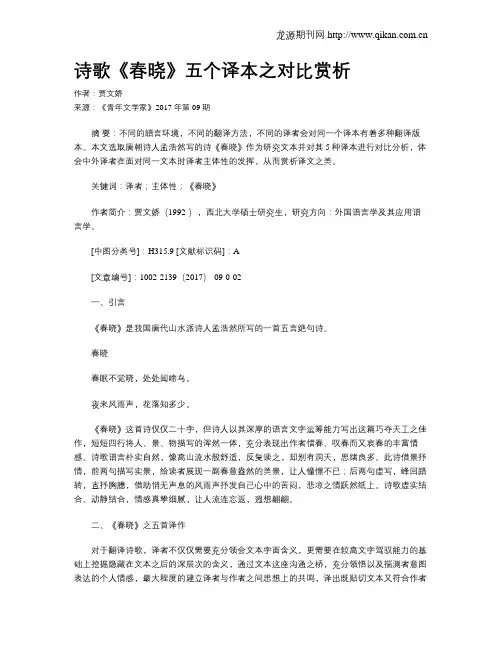
诗歌《春晓》五个译本之对比赏析作者:贾文娇来源:《青年文学家》2017年第09期摘要:不同的語言环境,不同的翻译方法,不同的译者会对同一个译本有着多种翻译版本。
本文选取唐朝诗人孟浩然写的诗《春晓》作为研究文本并对其5种译本进行对比分析,体会中外译者在面对同一文本时译者主体性的发挥,从而赏析译文之美。
关键词:译者;主体性;《春晓》作者简介:贾文娇(1992-),西北大学硕士研究生,研究方向:外国语言学及其应用语言学。
[中图分类号]:H315.9 [文献标识码]:A[文章编号]:1002-2139(2017)-09-0-02一、引言《春晓》是我国唐代山水派诗人孟浩然所写的一首五言绝句诗。
春晓春眠不觉晓,处处闻啼鸟。
夜来风雨声,花落知多少。
《春晓》这首诗仅仅二十字,但诗人以其深厚的语言文字运筹能力写出这篇巧夺天工之佳作,短短四行将人、景、物描写的浑然一体,充分表现出作者惜春、叹春而又哀春的丰富情感。
诗歌语言朴实自然,像高山流水般舒适,反复读之,却别有洞天,思绪良多。
此诗借景抒情,前两句描写实景,给读者展现一副春意盎然的美景,让人憧憬不已;后两句虚写,峰回路转,直抒胸臆,借助悄无声息的风雨声抒发自己心中的苦闷,悲凉之情跃然纸上。
诗歌虚实结合、动静结合,情感真挚细腻,让人流连忘返,遐想翩翩。
二、《春晓》之五首译作对于翻译诗歌,译者不仅仅需要充分领会文本字面含义,更需要在较高文字驾驭能力的基础上挖掘隐藏在文本之后的深层次的含义,通过文本这座沟通之桥,充分领悟以及揣测者意图表达的个人情感,最大程度的建立译者与作者之间思想上的共鸣,译出既贴切文本又符合作者内心情感的译本。
《春晓》英译文共有 31个,本文选取许渊冲、翁显良、吴均陶、WitterBynner、John Turner五位译者的《春晓》英译版进行对比赏析,通过分析每位译者各自的译本以及对比这五个版本的异同,从而来探讨其中如何展现了不同译文的艺术美。
译文(1)许渊冲译Spring Morning This spring morning in bed I’ m lying, Not to awake till birds are crying. After one night of wind and showers,How many are the fallen flowers.译文(2)翁显良译 One Morning in Spring Late! This spring morning as I awake I know. All around me the birds are crying, crying, The storm last night,I sensed its fury. How many, I wonder, are fallen, poor dear flowers!译文(3)吴钧陶译 The Spring Dawn Slumbering,I know not the spring dawn is peeping,But everywhere the singing birds are cheeping. Last night I heard the rain dripping and wind weeping,How many petals are now on the ground sleeping?译文(4)Witter Bynner 译A Spring Morning I awake light-hearted this morning of spring,Everywhere round me the singing of birds,But now I remember the night, the storm, And I wonder how many blossoms were broken?译文(5)John Turner译Dawn in Spring How suddenly the morning comes in Spring! On every side you can hear the sweet birds sing. Last night a midst the storm– Ah, who can tell, With wind and rain, how many blossoms fell?许先生的译文不仅“音美”而且“形美”,该译文字数最少,简单凝练,概括性强,与原文对应,每行长度对等,衔接自然巧妙。

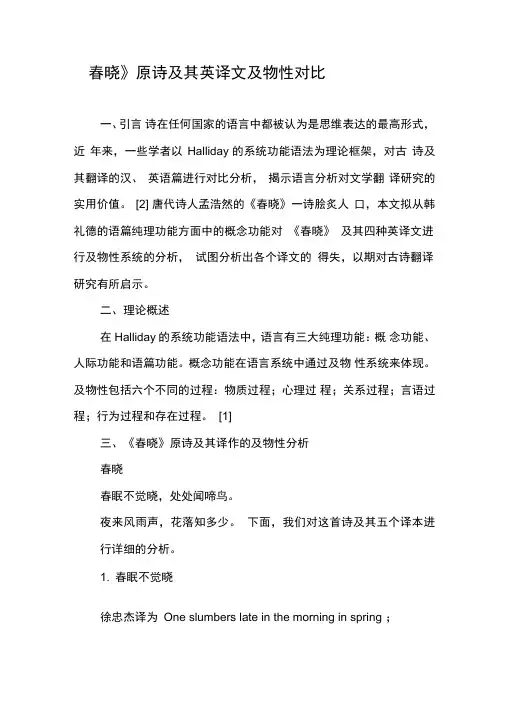
春晓》原诗及其英译文及物性对比一、引言诗在任何国家的语言中都被认为是思维表达的最高形式,近年来,一些学者以Halliday 的系统功能语法为理论框架,对古诗及其翻译的汉、英语篇进行对比分析,揭示语言分析对文学翻译研究的实用价值。
[2] 唐代诗人孟浩然的《春晓》一诗脍炙人口,本文拟从韩礼德的语篇纯理功能方面中的概念功能对《春晓》及其四种英译文进行及物性系统的分析,试图分析出各个译文的得失,以期对古诗翻译研究有所启示。
二、理论概述在Halliday 的系统功能语法中,语言有三大纯理功能:概念功能、人际功能和语篇功能。
概念功能在语言系统中通过及物性系统来体现。
及物性包括六个不同的过程:物质过程;心理过程;关系过程;言语过程;行为过程和存在过程。
[1]三、《春晓》原诗及其译作的及物性分析春晓春眠不觉晓,处处闻啼鸟。
夜来风雨声,花落知多少。
下面,我们对这首诗及其五个译本进行详细的分析。
1. 春眠不觉晓徐忠杰译为One slumbers late in the morning in spring ;许渊冲译为This morn of spring in bed I 'm lying ;吴均陶译为Slumbering ,I know not the spring dawn in peeping ,翁显良译为Late !this spring morning as I awake I know.第一句诗的翻译的处理,徐将此句译为一个行为过程,我们可以看到睡眠是与我们生理有关的,所以我们不把它归入物质过程,而归入行为过程。
许在这里把第一句理解为一个物质过程,其中动作者是“ I ”,过程是“ amlying in ”,目标是“ bed”,而“ this morn of spring ”是环境成分. 我们从吴的译文发现了既有行为过程,又有心理过程,首先来看行为过程,我们把“slumbering ” 认为是一个行为过程,如上对徐的分析,至于心理过程,我们可以看到其中“ I” 为感觉者(sensor ),“know” 代表这是一个表示认知的心理过程,被感知的现象是“the spring dawn ”,而“ in peeping ” 这个介词短语属于环境成分;翁的译文也属于心理过程,分析同上。
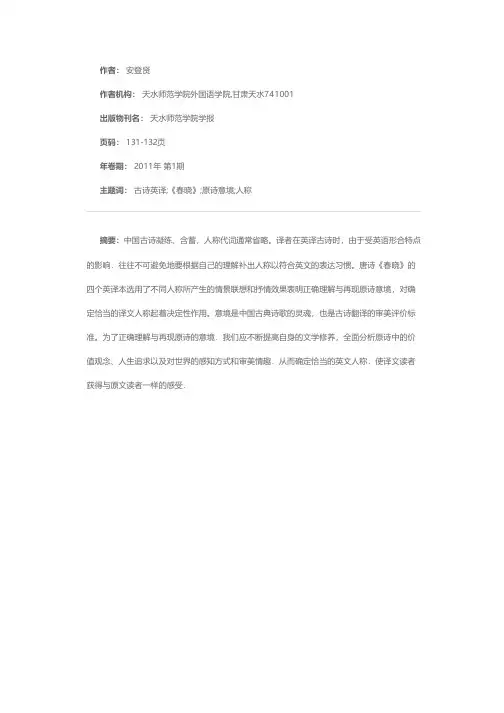
作者: 安登贤
作者机构: 天水师范学院外国语学院,甘肃天水741001
出版物刊名: 天水师范学院学报
页码: 131-132页
年卷期: 2011年 第1期
主题词: 古诗英译;《春晓》;原诗意境;人称
摘要:中国古诗凝练、含蓄,人称代词通常省略。
译者在英译古诗时,由于受英语形合特点的影响.往往不可避免地要根据自己的理解补出人称以符合英文的表达习惯。
唐诗《春晓》的四个英译本选用了不同人称所产生的情景联想和抒情效果表明正确理解与再现原诗意境,对确定恰当的译文人称起着决定性作用。
意境是中国古典诗歌的灵魂,也是古诗翻译的审美评价标准。
为了正确理解与再现原诗的意境.我们应不断提高自身的文学修养,全面分析原诗中的价值观念、人生追求以及对世界的感知方式和审美情趣.从而确定恰当的英文人称.使译文读者获得与原文读者一样的感受.。
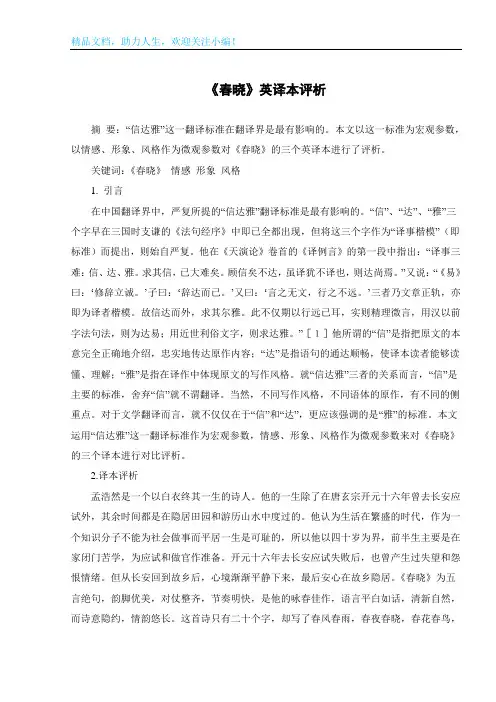
《春晓》英译本评析摘要:“信达雅”这一翻译标准在翻译界是最有影响的。
本文以这一标准为宏观参数,以情感、形象、风格作为微观参数对《春晓》的三个英译本进行了评析。
关键词:《春晓》情感形象风格1. 引言在中国翻译界中,严复所提的“信达雅”翻译标准是最有影响的。
“信”、“达”、“雅”三个字早在三国时支谦的《法句经序》中即已全都出现,但将这三个字作为“译事楷模”(即标准)而提出,则始自严复。
他在《天演论》卷首的《译例言》的第一段中指出:“译事三难:信、达、雅。
求其信,已大难矣。
顾信矣不达,虽译犹不译也,则达尚焉。
”又说:“《易》曰:‘修辞立诚。
’子曰:‘辞达而已。
’又曰:‘言之无文,行之不远。
’三者乃文章正轨,亦即为译者楷模。
故信达而外,求其尔雅。
此不仅期以行远已耳,实则精理微言,用汉以前字法句法,则为达易;用近世利俗文字,则求达雅。
”[1]他所谓的“信”是指把原文的本意完全正确地介绍,忠实地传达原作内容;“达”是指语句的通达顺畅,使译本读者能够读懂、理解;“雅”是指在译作中体现原文的写作风格。
就“信达雅”三者的关系而言,“信”是主要的标准,舍弃“信”就不谓翻译。
当然,不同写作风格,不同语体的原作,有不同的侧重点。
对于文学翻译而言,就不仅仅在于“信”和“达”,更应该强调的是“雅”的标准。
本文运用“信达雅”这一翻译标准作为宏观参数,情感、形象、风格作为微观参数来对《春晓》的三个译本进行对比评析。
2.译本评析孟浩然是一个以白衣终其一生的诗人。
他的一生除了在唐玄宗开元十六年曾去长安应试外,其余时间都是在隐居田园和游历山水中度过的。
他认为生活在繁盛的时代,作为一个知识分子不能为社会做事而平居一生是可耻的,所以他以四十岁为界,前半生主要是在家闭门苦学,为应试和做官作准备。
开元十六年去长安应试失败后,也曾产生过失望和怨恨情绪。
但从长安回到故乡后,心境渐渐平静下来,最后安心在故乡隐居。
《春晓》为五言绝句,韵脚优美,对仗整齐,节奏明快,是他的咏春佳作,语言平白如话,清新自然,而诗意隐约,情韵悠长。
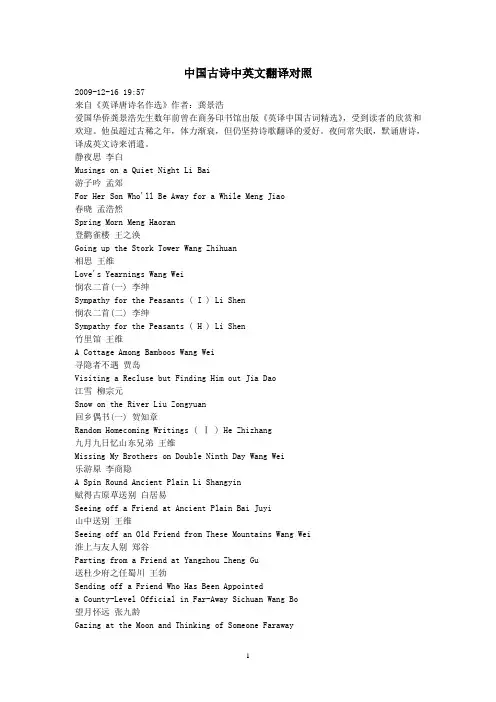
中国古诗中英文翻译对照2009-12-16 19:57来自《英译唐诗名作选》作者:龚景浩爱国华侨龚景浩先生数年前曾在商务印书馆出版《英译中国古词精选》,受到读者的欣赏和欢迎。
他虽超过古稀之年,体力渐衰,但仍坚持诗歌翻译的爱好。
夜间常失眠,默诵唐诗,译成英文诗来消遣。
静夜思李白Musings on a Quiet Night Li Bai游子吟孟郊For Her Son Who'll Be Away for a While Meng Jiao春晓孟浩然Spring Morn Meng Haoran登鹳雀楼王之涣Going up the Stork Tower Wang Zhihuan相思王维Love's Yearnings Wang Wei悯农二首(一) 李绅Sympathy for the Peasants ( I ) Li Shen悯农二首(二) 李绅Sympathy for the Peasants ( H ) Li Shen竹里馆王维A Cottage Among Bamboos Wang Wei寻隐者不遇贾岛Visiting a Recluse but Finding Him out Jia Dao江雪柳宗元Snow on the River Liu Zongyuan回乡偶书(一) 贺知章Random Homecoming Writings ( Ⅰ ) He Zhizhang九月九日忆山东兄弟王维Missing My Brothers on Double Ninth Day Wang Wei乐游原李商隐A Spin Round Ancient Plain Li Shangyin赋得古原草送别白居易Seeing off a Friend at Ancient Plain Bai Juyi山中送别王维Seeing off an Old Friend from These Mountains Wang Wei淮上与友人别郑谷Parting from a Friend at Yangzhou Zheng Gu送杜少府之任蜀川王勃Sending off a Friend Who Has Been Appointeda County-Level Official in Far-Away Sichuan Wang Bo望月怀远张九龄Gazing at the Moon and Thinking of Someone FarawayZhang J iuling白石滩王维White Stone Beach Wang Wei鸟鸣涧王维Birds Chirping over the Hill Creek Wang Wei春夜喜雨杜甫Propitious Rain Falling at Midnight Du Fu宿建德江孟浩然Staying Overnight on Jiande River Meng Haoran滁州西涧韦应物Chuzhou's West Brook Wei Yingwu题破山寺后禅院常建Meditation Rooms at the Back of the Cleft-BoulderHill Temple Chang Jian绝句杜甫A Heptasyllabic Quatrain Du Fu阙题刘脊虚A Poem Lacking a Title Liu Shenxu送元二使安西王维Sending off a Friend, Who Has Been Appointed Envoy to the West Lands Wang Wei凉州词王之涣Liangzhou Song Wang Zhihuan凉州词王翰Liangzhou Song Wang Hah夜宿山寺李白Staying Overnight in a Mountain Temple Li Bai杂诗(其二) 王维Miscellaneous Poems (Second in a Series) Wang Wei问刘十九自居易Asking a Friend Bai Juyi风李峤Wind Li Qiao马诗李贺A Horse Poem Li He秋浦歌李白Autumn Waterside Songs Li Bai剑客贾岛Jianke Jia Dao于易水送人骆宾王Sending off a Warrior By the Yishui River LuG Binwang 春怨金昌绪Complaint Against Spring lin Changxu竹枝词刘禹锡The Bamboo Song Liu Yuxi城东早春杨巨源Early Spring in East City Yang Juyuan晚春韩愈Late Spring Han Yu山亭夏日高骈A Summer's Day in a Hill Garden Gao Pian秋日耿讳An Autumn Day Geng Wei白雪歌送武判官归京岑参Snow (For Chief of Secretarial Staff Wu,Who Was B&ng Called Back to the Capital) Cen Shen过故人庄孟浩然Visiting an Old Friend's Country Place Meng Haoran江村即事司空曙Scene from a Riverside Village Sikong Shu社日王驾Community Day Wang Jia送人游吴杜荀鹤Seeing off a Friend, Who Was Going to Tour Suzhou Du Xunhe 枫桥夜泊张继Night Boat Call at Maple Bridge, Suzhou Zhang Ji早发白帝城李白Sailing Early from Baidi Town Li Bai黄鹤楼送孟浩然之广陵李白Seeing off Fellow Poet Meng Haoran, Who WasLeaving the Yellow Crane Tower for Yangzhou Li Bai黄鹤楼崔颢The Yellow Crane Tower Cui Hao夜雨寄北李商隐A Letter Sent North about These Nightly Rainsin Bashan Mountains Li Shangyin无题李商隐Poem Without a Title Li Shangyin登幽州台歌陈子昂Ascending Youzhou Terrace Chen Zi'ang与诸子登岘首孟浩然Climbing Mount Xianshou with Scholarly Friends Meng Haoran 滕王阁王勃Prince of Teng's Pavilion-House Wang Bo洛阳道储光羲The Luoyang Highway Chu Guangxi遣悲怀元稹Venting My Sorrow Yuan Zhen赠卖松人于武陵To a Tree Vendor Yu Wuling乌衣巷刘禹锡Black Robe Lane Liu Yuxi清明杜牧The Day of Clear and Bright Du Mu江南春杜牧Spring Comes to Jiangnan Du Mu泊秦淮杜牧Overnight Stay on Qinhuai River, Nanjing Du Mu山行杜牧Driving by the Mountain Du Mu金缕衣杜秋娘Garment Stitched with Gold Threads Du Qiuniang自遣罗隐Self Consolation Luo Yin题都城南庄崔护South Side of the Capital City Cui Hu月下独酌李白Drinking Alone Underneath a Moon Li Bai将进酒李白Drink Your Fill! Li Bai春日忆李白杜甫Remembering Li Bai on a Spring Day Du Fu春望杜甫Spring Outlook Du Fu前出塞杜甫Song of the Fortified Town (One from a First Group of"Fortified Town" Poems) Du Fu石壕吏杜甫A Village Official Du Fu陪诸贵公子丈八沟携妓纳凉晚际遇雨杜甫A Cruise on Long-Ditch Creek in the Company of Some Young Gentlemen and Their "Hired" Ladies, and Got Caught in a Shower Along the Twilight Hour Du Fu与朱山人杜甫To Zhu—the Mountain Person Du Fu赠卫八处士杜甫To a Younger Friend, Who Is a Retiring Sort of Person Du Fu李白篇送友人青山横北郭白水绕东城此地一为别孤蓬万里征浮云游子意落日故人情挥手自兹去萧萧班马鸣Farewell To A FriendGreen mountains bar the northern sky;White water girds the eastern town.Here is the place to say good-bye;You'll drift like lonely thisledown.With floating cloud you'll float away;Like parting day I'll part from you.We wave as you start on your way;Our steeds still neigh, "Adieu, adieu!"登金陵凤凰台凤凰台上凤凰游凤去台空江自流吴宫花草埋幽径晋代衣冠成古丘三山半落青天外二水中分白鹭洲总为浮云能蔽日长安不见使人愁On Phoenix Terrace At JinlingOn Phoenix Terrace once phoenixes came to sing;The birds are gone, but still roll on the river's waves. The ruined palace's buried 'neath the weeds in spring; The ancient sages in caps and gowns all lie in graves. The three-peak'd mountain is half lost in azure sky; The two-fork'd stream by Egret Isle is kept apart.As floating clouds can veil the bright sun from the eye, Imperial Court, now out of sight, saddens my heart.宣州谢眺楼饯别校书叔云弃我去者昨日之日不可留乱我心者今日之日多烦忧长风万里送秋雁对此可以酣高楼蓬莱文章建安骨中间小谢又清发俱怀逸兴壮思飞欲上青天览明月抽刀断水水更流举杯销愁愁更愁人生在世不称意明朝散发弄扁舟Farewell To Uncle Yun, The Imperial Librarian, At The Xie Tiao Pavilion In XuanzhouWhat left me yesterdayCan be retained no more;What worries me todayAre the times for which I feel sore.In autumn wind for miles and miles the wild geese fly.Let's follow them with eyes and drink in tower high.Your writing's forcible, like ancient poets, whileMine is in Junior Xie's direct and easy style.Both of us have ambitions high;We'd bring the moon down from the sky.Cut running water with a sword, it will faster flow;Drink wine to drown your sorrow, it will heavier grow.If we despair in our lifetime of all affairs,Tomorrow let us sail away with loosened hairs.赠汪伦李白乘舟将欲行忽闻岸上踏歌声桃花潭水深千尺不及汪伦送我情To Wang LunI, Li Bai, sit aboard a ship about to goWhen suddenly on shore your farewell songs o'erflow. However deep the Lake of Peach Blossom may be,It's not so deep, O Wang Lun! as your love for me.早发白帝城朝辞白帝彩云间千里江陵一日还两岸猿声啼不住轻舟已过万重山Leaving White Emperor Town At DawnLeaving at dawn the White Emperor crowned with cloud, I've sailed a thousand li through canyons in a day. With monkeys' sad adieus the riverbanks are loud;My skiff has left ten thousand mountains far away.月下独酌花间一壶酒独酌无相亲举杯邀明月对影成三人月既不解饮影徒随我身暂伴月将影行乐须及春我歌月徘徊我舞影零乱醒时同交欢醉后各分散永结无情游相期邈云汉Drinking Alone Under The MoonAmong the flowers from a pot of wineI drink alone beneath the bright moonshine.I raise my cup to invite the moon, who blendsHer light with my shadow and we're three friends. The moon does not know how to drink her share;In vain my shadow follows me here and there. Together with them for the time I stayAnd make merry before spring's spend away.I sing the moon to linger with my song;My shadow disperses as I dance along.Sober, we three remain cheerful and gay; Drunken, we part and each goes his way.Our friendship will outshine all earthly love; Next time we'll meet beyond the stars above.杜甫篇望岳岱宗夫如何齐鲁青未了造化钟神秀阴阳割昏晓荡胸生层云决眦入归鸟会当凌绝顶一览众山小Gazing At Mount TaiO, peak of peaks, how high it stands!One boundless green o'erspreads two states.A marvel done by nature's hands,O'er light ang shade it dominates.Clouds rise therefrom and lave my breast;I strain my eyes and see birds fleet.I must ascend the mountain's crest;It dwarfs all peaks under my feet.赠李白秋来相顾尚飘蓬未就丹砂愧葛洪痛饮狂歌空度日飞扬跋扈为谁雄To Li BaiWhen autumn comes, you're drifting still like thistledown. You try to find the way to heaven, but you fail.In singing mad and drinking dead your days you drown.For whom will fly the roc? For whom will leap the whale?兵车行车辚辚马萧萧行人弓箭各在腰耶娘妻子走相送尘埃不见咸阳桥牵衣顿足拦道哭哭声直上干云霄道旁过者问行人行人但云点行频或从十五北防河便至四十西营田去时里正与裹头归来头白还戍边边廷流血成海水武皇开边意未已君不闻汉家山东二百州千村万落生荆杞纵有健妇把锄犁禾生陇亩无东西况复秦兵耐苦战被驱不异犬与鸡长者虽有问役夫敢伸恨且如今年冬未休关西卒县官急索租租税从何出信知生男恶反是生女好生女犹得嫁比邻生男埋没随百草君不见青海头古来白骨无人收新鬼烦冤旧鬼哭天阴雨湿声啾啾Song Of The ConscriptsChariots rumbleand horses grumble.The conscripts march with bow and arrows at the waist.Their fathers, mothers, wives and children come in hasteTo see them off; the bridge is shrouded in dust they've raised.They clutch at the men's coats and stamp and bar the way;Their grief cries loud and strikes the cloud straight, straightaway. Another onlooker by roadside asks an enrollee,"The conscription is frequent," only answers he."Some went north at fifteen to guard the rivershoreAnd were sent west to till the land at forty-four.The elder bound their young heads when they went away;Just home, they're sent to the frontier though their hair's grey. The field on borderland becomes a sea of blood;The emperor's greed for land is still at high blood.Have you not heard two hundred districts east of the Hua Mountain lie Where briers and brambles grow in villages far and night?Although stout women can wield the plough and the hoe,They know not east from west where thorns and weeds o'ergrow.The enemy are used to hard and stubborn fight:Our men are driven just like dogs or fowls in flight.You are kind to ask me.To complain I'm not free.In winter of this yearConscription goes on here.The magistrates for taxes press;How can we pay them in distress!If we had known sons bring no joy,We'd have preferred girl to boy.A daughter can be married to a neighbour, alas!A son can only be buried under the grass!Have you not seenOn borders greenBleached bones since olden days unburied on the plain?The old ghosts weep and cry, while the new ghosts complain;The air is loud with screech and scream in gloomy rain."将进酒 ----李白君不见,黄河之水天上来,奔流到海不复回?君不见,高堂明镜悲白发,朝如青丝暮成雪?人生得意须尽欢,莫使金樽空对月,天生我材必有用,千金散尽还复来。
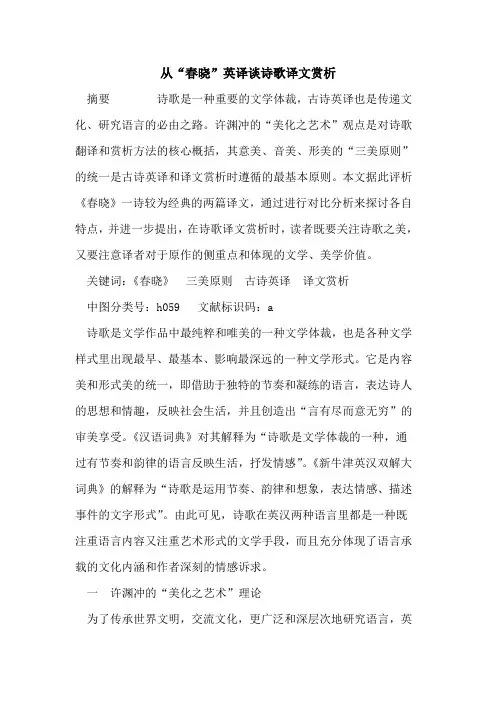
从“春晓”英译谈诗歌译文赏析摘要诗歌是一种重要的文学体裁,古诗英译也是传递文化、研究语言的必由之路。
许渊冲的“美化之艺术”观点是对诗歌翻译和赏析方法的核心概括,其意美、音美、形美的“三美原则”的统一是古诗英译和译文赏析时遵循的最基本原则。
本文据此评析《春晓》一诗较为经典的两篇译文,通过进行对比分析来探讨各自特点,并进一步提出,在诗歌译文赏析时,读者既要关注诗歌之美,又要注意译者对于原作的侧重点和体现的文学、美学价值。
关键词:《春晓》三美原则古诗英译译文赏析中图分类号:h059 文献标识码:a诗歌是文学作品中最纯粹和唯美的一种文学体裁,也是各种文学样式里出现最早、最基本、影响最深远的一种文学形式。
它是内容美和形式美的统一,即借助于独特的节奏和凝练的语言,表达诗人的思想和情趣,反映社会生活,并且创造出“言有尽而意无穷”的审美享受。
《汉语词典》对其解释为“诗歌是文学体裁的一种,通过有节奏和韵律的语言反映生活,抒发情感”。
《新牛津英汉双解大词典》的解释为“诗歌是运用节奏、韵律和想象,表达情感、描述事件的文字形式”。
由此可见,诗歌在英汉两种语言里都是一种既注重语言内容又注重艺术形式的文学手段,而且充分体现了语言承载的文化内涵和作者深刻的情感诉求。
一许渊冲的“美化之艺术”理论为了传承世界文明,交流文化,更广泛和深层次地研究语言,英汉诗歌互译始终是翻译领域的一个热点,是可译还是不可译、是重意义表达还是重形式表现之类的讨论,多年来未曾休止;对诗歌译文的赏析也常常让读者费解,是从本族语的特点还是从目标语的特点着眼;对诗歌之美如何在译文中得到体现也是众说纷纭。
特别是汉语古诗英译,在中外文学评论界、翻译界有着悠久的历史。
许多中外学者、翻译学家为此做出了不懈的努力,提出了各具特色的英译古诗的原则和赏析方式。
王秉钦在他的《20世纪中国翻译思想史》一书中总结了中国传统翻译思想发展史的十大学说:古代的“文质说”,近代严复的“信达雅说”,现代鲁迅的“信顺说”,郭沫若的“翻译创作论”,林语堂的“翻译美学论”,朱光潜的“翻译艺术论”,茅盾的“艺术创造性翻译论”,傅雷的“神似说”,钱钟书的“化境说”,焦菊隐的“整体论”,等等,这些理论无一不影响着古诗英译方式和赏析角度。
三种译本的《春晓》摘要:通过对比《春晓》三种有代表性的英译文,分析了由于中国古典诗歌自身的特点以及语言和文化差异造成的古诗翻译中相应的难点,对比剖析了中外名家译例的特点并着重探讨其在炼词方面的得失。
关键词:中国古诗;翻译;对比;炼词1 引言唐朝是中国历史上政治开明、经济繁荣、文化昌盛的时期,在这个时期中国古体诗(格律诗)的创作达到了鼎盛。
唐诗语言优美、文字流畅、意境高雅、情感真挚、思想开放而深邃,是中华民族文学宝库的精华,也是绽放在世界文苑里的一枝奇葩。
诺贝尔文学评奖委员会主席埃斯库马克盛赞中国文学独特的艺术美时曾说:“世界上哪些作品能与中国的唐诗和《红楼梦》相比呢?”《春晓》是中国千百年来脍炙人口的一首唐诗。
此诗语言精炼自然,音韵和谐婉转,读来意味无穷。
中外许多著名诗人,学者和翻译家都曾将其译成英文和其他文字。
本文选取了其中三种有代表性的英译文,并对每篇译文的特点及其炼词略作剖析,以期对古诗英译有进一步的了解。
2 原诗与译诗的比较与分析春晓孟浩然春眠不觉晓,处处闻啼鸟。
夜来风雨声,花落知多少?译文一:Witter Bynner译,A Spring MorningI awake light-hearted this morning of spring,Everywhere round me the singing of birds——But now I remember the night, the storm,And I wonder how many blossoms were broken?(The Jade Mountain, Witter Bynner and Kiang Kang-hu, New York, Knopf, 1929) 简评:Bynner是英译中国古诗的名家。
对于他的译文,评论家的意见各不相同。
吕叔湘在这首诗的《赘言》中写道:“通首言之,仍是译中佳品”。
从炼词的角度看,Bynner在译文的前两句中使用了“light-hearted”和“singing of birds”,勾画出百鸟欢唱令人心怡神爽的美春景象,体现了原诗前两句的悦春之情。
秦大川古诗十九首英译 1.《登鹳雀楼》。
White clouds float in the vast sky,。
I climb the Stork Tower high.Looking afar, mountains stretch wide,。
Rivers flow, a magnificent sight.2.《春晓》。
Dawn breaks, the world awakes,。
Birds sing, a cheerful serenade.Gentle breeze, flowers bloom,。
Nature's beauty, a delightful room.3.《秋风词》。
Autumn wind blows, leaves fall,。
The air is filled with a nostalgic call. Golden hues, a tapestry of trees,。
Whispering secrets in the breeze.4.《夜泊牛渚怀古》。
Moored by Niuzhu, I reminisce,。
Ancient tales echo, memories persist.Moonlight shimmers on the river's face,。
Silent night, a tranquil embrace.5.《登高》。
Climbing high, I reach the peak,。
Endless mountains, nature's mystique.Clouds caress the lofty hills,。
A sense of freedom, my heart fills.6.《望月怀远》。
Gazing at the moon, thoughts wander far,。
Missing loved ones, like a distant star. Moonlight casts a silver glow,。
《春晓》原诗及其英译文及物性对比作者:徐瑞敏来源:《新教育时代》2014年第15期摘要:本文从Halliday的系统功能语法中的及物性角度入手,将唐诗《春晓》及其四篇英文译本进行对比分析研究,从中我们可以看出在这些译文当中,吴均陶先生的译文最佳。
希望本文的分析会给古诗英译得失分析及古诗翻译带来启示。
关键词:及物性系统《春晓》一、引言诗在任何国家的语言中都被认为是思维表达的最高形式,近年来,一些学者以Halliday的系统功能语法为理论框架,对古诗及其翻译的汉、英语篇进行对比分析,揭示语言分析对文学翻译研究的实用价值。
[2]唐代诗人孟浩然的《春晓》一诗脍炙人口,本文拟从韩礼德的语篇纯理功能方面中的概念功能对《春晓》及其四种英译文进行及物性系统的分析,试图分析出各个译文的得失,以期对古诗翻译研究有所启示。
二、理论概述在Halliday的系统功能语法中,语言有三大纯理功能:概念功能、人际功能和语篇功能。
概念功能在语言系统中通过及物性系统来体现。
及物性包括六个不同的过程:物质过程;心理过程;关系过程;言语过程;行为过程和存在过程。
[1]三、《春晓》原诗及其译作的及物性分析春晓春眠不觉晓,处处闻啼鸟。
夜来风雨声,花落知多少。
下面,我们对这首诗及其五个译本进行详细的分析。
1.春眠不觉晓徐忠杰译为One slumbers late in the morning in spring;许渊冲译为This morn of spring in bed I’m lying;吴均陶译为Slumbering , I know not the spring dawn in peeping,翁显良译为Late!this spring morning as I awake I know.第一句诗的翻译的处理,徐将此句译为一个行为过程,我们可以看到睡眠是与我们生理有关的,所以我们不把它归入物质过程,而归入行为过程。
许在这里把第一句理解为一个物质过程,其中动作者是“I”,过程是“ am lying in”,目标是“bed”,而“this morn of spring”是环境成分. 我们从吴的译文发现了既有行为过程,又有心理过程,首先来看行为过程,我们把“slumbering” 认为是一个行为过程,如上对徐的分析,至于心理过程,我们可以看到其中“I” 为感觉者(sensor),“know” 代表这是一个表示认知的心理过程,被感知的现象是“the spring dawn”,而“in peeping” 这个介词短语属于环境成分;翁的译文也属于心理过程,分析同上。